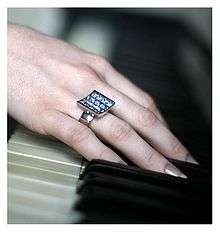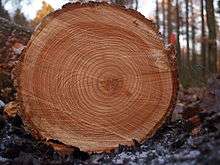Definify.com
Webster 1913 Edition
Ring
Ring
Hath
Ring
,Ring
,Ring
,Where youthful charioteers contend for glory.
Aye round about Jove's alter sing.
Ring
,Ring
,Webster 1828 Edition
Ring
RING
,RING
,RING
,RING
,RING
, v.i.Definition 2025
Ring
Ring
English
Proper noun
Ring
Anagrams
German
Etymology
From Old High German ring, from Proto-Germanic *hringaz, cognate with Dutch ring, English ring, Swedish ring.
Pronunciation
- IPA(key): /ʀɪŋ/
Noun
Ring m (genitive Rings or Ringes, plural Ringe, diminutive Ringchen n or Ringlein n)
- a ring (a circular and hollow object, made of any material.)
- a ring (a piece of trinket (consisting of a precious metal, in general) worn around the finger)
- a ring (a group of people, often involved into criminal and illegal actions)
- (mathematics) a ring (algebraic structure)
- (geometry) a ring (planar geometrical figure)
- (heraldry) an annulet (ring used as a charge)
- (astronomy) a ring (a collection of material orbiting a planet)
- (sports) a ring (a place where events such as wrestling and boxingtake place)
- a street that encircles a city where once the old town walls have been.
Declension
Derived terms
|
|
ring
ring
English
Noun
ring (plural rings)
- (physical) A solid object in the shape of a circle.
- A circumscribing object, (roughly) circular and hollow, looking like an annual ring, earring, finger ring etc.
- A round piece of (precious) metal worn around the finger or through the ear, nose, etc.
- William Shakespeare (1564-1616)
- The dearest ring in Venice will I give you.
- William Shakespeare (1564-1616)
- (Britain) A bird band, a round piece of metal put around a bird's leg used for identification and studies of migration.
- (Britain) A burner on a kitchen stove.
- In a jack plug, the connector between the tip and the sleeve.
- An instrument, formerly used for taking the sun's altitude, consisting of a brass ring suspended by a swivel, with a hole at one side through which a solar ray entering indicated the altitude on the graduated inner surface opposite.
- (botany) A flexible band partly or wholly encircling the spore cases of ferns.
- (physical) A group of objects arranged in a circle.
- A circular group of people or objects.
- a ring of mushrooms growing in the wood
- John Milton (1608-1674)
- And hears the Muses in a ring / Aye round about Jove's altar sing.
- 1944, Miles Burton, chapter 5, in The Three Corpse Trick:
- The hovel stood in the centre of what had once been a vegetable garden, but was now a patch of rank weeds. Surrounding this, almost like a zareba, was an irregular ring of gorse and brambles, an unclaimed vestige of the original common.
- (astronomy) A formation of various pieces of material orbiting around a planet.
- (Britain) A large circular prehistoric stone construction such as Stonehenge.
- A circular group of people or objects.
- A piece of food in the shape of a ring.
- onion rings
- A place where some sports or exhibitions take place; notably a circular or comparable arena, such as a boxing ring or a circus ring; hence the field of a political contest.
- Edmund Smith (1672–1710)
- Place me, O, place me in the dusty ring, / Where youthful charioteers contend for glory.
- Edmund Smith (1672–1710)
- An exclusive group of people, usually involving some unethical or illegal practices.
- a crime ring; a prostitution ring; a bidding ring (at an auction sale)
- Edward Augustus Freeman (1823-1892)
- the ruling ring at Constantinople
- 1928, Upton Sinclair, Boston
- It's a blackmail ring, and the district attorneys get a share of the loot.
- (chemistry) A group of atoms linked by bonds to form a closed chain in a molecule.
- a benzene ring
- (geometry) A planar geometrical figure included between two concentric circles.
- (typography) A diacritical mark in the shape of a hollow circle placed above or under the letter; a kroužek.
- (historical) An old English measure of corn equal to the coomb or half a quarter.
- 1866, James Edwin Thorold Rogers, A History of Agriculture and Prices in England, Volume 1, page 168.
- The ring is common in the Huntingdonshire accounts of Ramsey Abbey. It was equal to half a quarter, i.e., is identical with the coomb of the eastern counties. —
- 1866, James Edwin Thorold Rogers, A History of Agriculture and Prices in England, Volume 1, page 168.
- (computing theory) A hierarchical level of privilege in a computer system, usually at hardware level, used to protect data and functionality (also protection ring).
- 2007, Steve Anson, Steve Bunting, Mastering Windows Network Forensics and Investigation (page 70)
- Kernel Mode processes run in ring 0, and User Mode processes run in ring 3.
- 2007, Steve Anson, Steve Bunting, Mastering Windows Network Forensics and Investigation (page 70)
- (firearms) Either of the pair of clamps used to hold a telescopic sight to a rifle.
Synonyms
Derived terms
Translations
|
|
|
|
|
|
See also
-

A boxing ring.
-

A ring on a finger.
-

The rings of a tree.
-

The circus ring.
-
A ring on a bird's leg.
-

The rings of Saturn.
Verb
ring (third-person singular simple present rings, present participle ringing, simple past and past participle ringed)
- (transitive) To surround or enclose.
- The inner city was ringed with dingy industrial areas.
- (transitive, figuratively) To make an incision around; to girdle.
- They ringed the trees to make the clearing easier next year.
- (transitive) To attach a ring to, especially for identification.
- Only ringed hogs may forage in the commons.
- We managed to ring 22 birds this morning.
- (transitive) To surround or fit with a ring, or as if with a ring.
- to ring a pig's snout
- Shakespeare
- Ring these fingers.
- (falconry) To rise in the air spirally.
- 1877, Gerard Manley Hopkins, The Windhover:
- .. how he rung upon the rein of a wimpling wing ..
- 1877, Gerard Manley Hopkins, The Windhover:
Derived terms
Translations
|
|
Etymology 2
From Middle English ringen, from Old English hringan (“to ring, sound, clash; announce by bells”), from Proto-Germanic *hringijaną (“to resound, ring”), from Proto-Indo-European *(s)kreg- (“to crow, caw, croak, shout”). Cognate with Dutch ringen (“to ring”), Danish ringe (“to ring, call”), Swedish ringa (“to ring, call”), Icelandic hringja (“to ring, call”), Lithuanian krañkti (“to caw, croak, cough”), Albanian vring (“a high-pitched sound made by waving violently a solid object”).
Noun
ring (plural rings)
- The resonant sound of a bell, or a sound resembling it.
- The church bell's ring could be heard the length of the valley.
- The ring of hammer on anvil filled the air.
- (figuratively) A pleasant or correct sound.
- The name has a nice ring to it.
- (figuratively) A sound or appearance that is characteristic of something.
- Her statements in court had a ring of falsehood.
- (colloquial) A telephone call.
- I’ll give you a ring when the plane lands.
- Any loud sound; the sound of numerous voices; a sound continued, repeated, or reverberated.
- Francis Bacon
- the ring of acclamations fresh in his ears
- Francis Bacon
- A chime, or set of bells harmonically tuned.
- St Mary's has a ring of eight bells.
- Fuller
- as great and tunable a ring of bells as any in the world
Derived terms
Translations
Verb
ring (third-person singular simple present rings, present participle ringing, simple past rang or (nonstandard) rung, past participle rung)
- (intransitive) Of a bell, to produce sound.
- The bells were ringing in the town.
- (transitive) To make (a bell) produce sound.
- The deliveryman rang the doorbell to drop off a parcel.
- Shakespeare
- The shard-borne beetle, with his drowsy hums, / Hath rung night's yawning peal.
- (intransitive, figuratively) To produce the sound of a bell or a similar sound.
- Whose mobile phone is ringing?
- (intransitive, figuratively) Of something spoken or written, to appear to be, to seem, to sound.
- That does not ring true.
- (transitive, colloquial, Britain, New Zealand) To telephone (someone).
- I will ring you when we arrive.
- (intransitive) to resound, reverberate, echo.
- 1898, J. Meade Falkner, Moonfleet Chapter 4
- So he spoke, and it seemed there was a little halting at first, as of men not liking to take Blackbeard's name in Blackbeard's place, or raise the Devil by mocking at him. But then some of the bolder shouted 'Blackbeard', and so the more timid chimed in, and in a minute there were a score of voices calling 'Blackbeard, Blackbeard', till the place rang again.
- 1919, Boris Sidis, The Source and Aim of Human Progress:
- It is instructive for us to learn as well as to ponder on the fact that "the very men who looked down with delight, when the sand of the arena reddened with human blood, made the arena ring with applause when Terence in his famous line: ‘Homo sum, Nihil humani alienum puto’ proclaimed the brotherhood of man."
- 1898, J. Meade Falkner, Moonfleet Chapter 4
- (intransitive) To produce music with bells.
- (Can we find and add a quotation of Holder to this entry?)
- (dated) To repeat often, loudly, or earnestly.
Derived terms
Translations
|
|
|
|
|
Etymology 3
A shortening of German Zahlring (“number(s) ring”); coined by mathematician David Hilbert in 1892. (Reference: Harvey Cohn, Advanced Number Theory, page 49.)
Noun
ring (plural rings)
- (algebra) An algebraic structure which consists of a set with two binary operations: an additive operation and a multiplicative operation, such that the set is an abelian group under the additive operation, a monoid under the multiplicative operation, and such that the multiplicative operation is distributive with respect to the additive operation.
- The set of integers, , is the prototypical ring.
- (algebra) An algebraic structure as above, but only required to be a semigroup under the multiplicative operation, that is, there need not be a multiplicative identity element.
- The definition of ring without unity allows, for instance, the set of even integers to be a ring.
Hypernyms
- pseudo-ring
- semiring
Hyponyms
Derived terms
- Boolean ring
- polynomial ring
Translations
See also
-

The ring of integers.
Anagrams
Czech
Pronunciation
Noun
ring m inan
- ring (place where some sports take place; boxing ring and similar)
Declension
Danish
Etymology 1
From Old Norse hringr, from Proto-Germanic *hringaz.
Pronunciation
- IPA(key): /renɡ/, [ʁæŋˀ]
Noun
ring c (singular definite ringen, plural indefinite ringe)
Inflection
Derived terms
Etymology 2
Verbal noun to ringe (“to ring”).
Pronunciation
- IPA(key): /renɡ/, [ʁæŋˀ]
Noun
ring n (singular definite ringet, plural indefinite ring)
- (archaic) ring (the resonant sound of a bell, a telephone call)
Inflection
Etymology 3
See ringe.
Pronunciation
- IPA(key): /renɡ/, [ʁæŋˀ]
Verb
ring
- imperative of ringe
Dutch
Pronunciation
- IPA(key): /rɪŋ/
- Rhymes: -ɪŋ
Etymology
From Old Dutch ring, from Proto-Germanic *hringaz.
Noun
ring m (plural ringen, diminutive ringetje n)
Derived terms
|
See also
Estonian
Etymology
From Middle Low German rink. Compare German Ring. See also rõngas.
Noun
ring (genitive ringi, partitive ringi)
Declension
| singular | plural | |
|---|---|---|
| nominative | ring | ringid |
| genitive | ringi | ringide |
| partitive | ringi | ringe / ringisid |
| illative | ringi / ringisse | ringidesse |
| inessive | ringis | ringides |
| elative | ringist | ringidest |
| allative | ringile | ringidele |
| adessive | ringil | ringidel |
| ablative | ringilt | ringidelt |
| translative | ringiks | ringideks |
| terminative | ringini | ringideni |
| essive | ringina | ringidena |
| abessive | ringita | ringideta |
| comitative | ringiga | ringidega |
See also
German
Pronunciation
- IPA(key): [ʁɪŋ]
Verb
ring
Hungarian
Pronunciation
- IPA(key): [ˈriŋɡ]
- Hyphenation: ring
Etymology 1
From a sound-imitative root + -g (“frequentative suffix”). [1]
Verb
ring
- (intransitive) to sway
Conjugation
| Infinitive | ringani | |||||||
|---|---|---|---|---|---|---|---|---|
| Past participle | ringott | |||||||
| Present participle | ringó | |||||||
| Future participle | - | |||||||
| Adverbial participle | ringva | |||||||
| Potential | ringhat | |||||||
| 1st person sg | 2nd person sg informal | 3rd person sg, 2nd person sg formal |
1st person pl | 2nd person pl informal | 3rd person pl, 2nd person pl formal |
|||
| Indicative Mood | Present | Indefinite | ringok | ringasz | ring | ringunk | ringotok or ringtok |
ringanak |
| Definite | intransitive verb, definite forms are not used | |||||||
| Past | Indefinite | ringtam | ringtál | ringott | ringtunk | ringtatok | ringtak | |
| Definite | - | |||||||
| Conditional Mood | Present | Indefinite | ringanék | ringanál | ringana | ringanánk | ringanátok | ringanának |
| Definite | - | |||||||
| Subjunctive Mood | Present | Indefinite | ringjak | ringj or ringjál |
ringjon | ringjunk | ringjatok | ringjanak |
| Definite | - | |||||||
| Conjugated Infinitive | ringanom | ringanod | ringania | ringanunk | ringanotok | ringaniuk | ||
Derived terms
Etymology 2
Noun
ring (plural ringek)
- (dated, boxing) ring, boxing ring (space in which a boxing match is contested)
Declension
| Inflection (stem in -e-, front unrounded harmony) | ||
|---|---|---|
| singular | plural | |
| nominative | ring | ringek |
| accusative | ringet | ringeket |
| dative | ringnek | ringeknek |
| instrumental | ringgel | ringekkel |
| causal-final | ringért | ringekért |
| translative | ringgé | ringekké |
| terminative | ringig | ringekig |
| essive-formal | ringként | ringekként |
| essive-modal | — | — |
| inessive | ringben | ringekben |
| superessive | ringen | ringeken |
| adessive | ringnél | ringeknél |
| illative | ringbe | ringekbe |
| sublative | ringre | ringekre |
| allative | ringhez | ringekhez |
| elative | ringből | ringekből |
| delative | ringről | ringekről |
| ablative | ringtől | ringektől |
| Possessive forms of ring | ||
|---|---|---|
| possessor | single possession | multiple possessions |
| 1st person sing. | ringem | ringjeim |
| 2nd person sing. | ringed | ringjeid |
| 3rd person sing. | ringje | ringjei |
| 1st person plural | ringünk | ringjeink |
| 2nd person plural | ringetek | ringjeitek |
| 3rd person plural | ringjük | ringjeik |
Synonyms
- szorító
References
- ↑ Gábor Zaicz, Etimológiai szótár: Magyar szavak és toldalékok eredete, Tinta Könyvkiadó, 2006, ISBN 963 7094 01 6
- ↑ Tótfalusi István, Idegenszó-tár: Idegen szavak értelmező és etimológiai szótára. Tinta Könyvkiadó, Budapest, 2005, ISBN 963 7094 20 2
Norwegian Bokmål
Etymology 1
From Old Norse hringr, from Proto-Germanic *hringaz.
Noun
ring m (definite singular ringen, indefinite plural ringer, definite plural ringene)
Derived terms
Etymology 2
Verb
ring
- imperative of ringe
References
- “ring” in The Bokmål Dictionary.
Norwegian Nynorsk
Etymology
From Old Norse hringr, from Proto-Germanic *hringaz.
Noun
ring m (definite singular ringen, indefinite plural ringar, definite plural ringane)
Derived terms
Verb
ring
References
- “ring” in The Nynorsk Dictionary.
Old High German
Etymology
From Proto-Germanic *hringaz
Noun
ring m
- ring (object in the shape of a circle)
Descendants
Serbo-Croatian
Etymology
Noun
ring m (Cyrillic spelling ринг)
- The ring (place where some sports take place; boxing ring and similar)
Swedish
Etymology
From Old Swedish ringer, from Old Norse hringr, from Proto-Germanic *hringaz.
Pronunciation
Noun
ring c
- ring; a circular piece of material
- The ring, place where sports such as boxing takes place
- (mathematics) A ring, algebraic structure
- (mathematics) A ring, planar geometrical figure
- (astronomy) A ring, collection of material orbiting some planets
- Each of the (usually three) years in a Swedish gymnasium (highschool)
- Ann började nyss andra ring.
- Ann recently began her second year at the gymnasium.
- Ann började nyss andra ring.
Declension
| Inflection of ring | ||||
|---|---|---|---|---|
| Singular | Plural | |||
| Indefinite | Definite | Indefinite | Definite | |
| Nominative | ring | ringen | ringar | ringarna |
| Genitive | rings | ringens | ringars | ringarnas |
Derived terms
Verb
ring
- imperative of ringa.